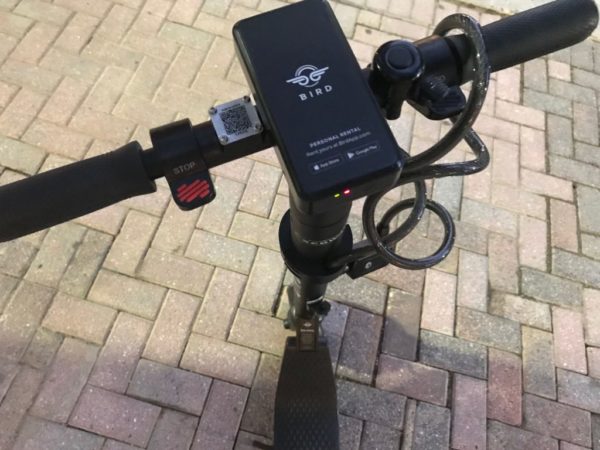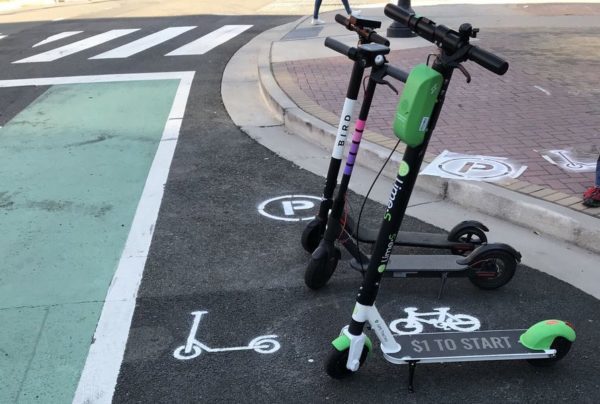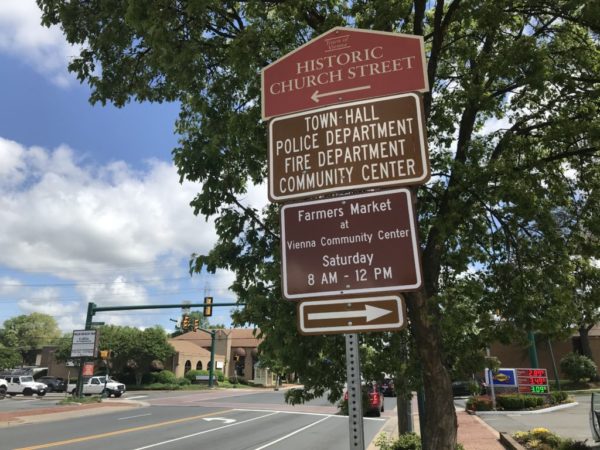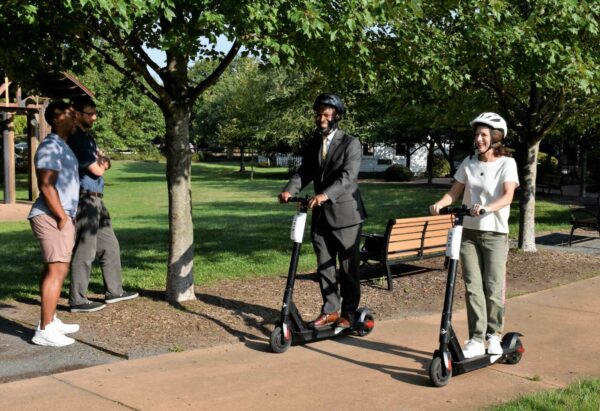
Vienna residents will soon be able to zip from one end of Maple Avenue to the other via electric scooter.
The e-scooter operator Bird will deliver 25 to 50 of the rentable devices beginning early next week as the first participant in a one-year pilot program approved in December 2019, the Town of Vienna announced on Wednesday (Sept. 8).
The scooters are now operational and got their first workout on the Town Green when Vienna Mayor Linda Colbert and Town Manager Mercury Payton conducted a test run Wednesday morning.
“The operation is pretty straightforward, and it seems very user-friendly,” Colbert said.
Payton added that the scooters will provide “a low-cost and environmentally friendly” alternative for people to travel around the 4.4 square-mile town without jumping in their cars.
Vienna started developing a shared mobility device pilot program after Gov. Ralph Northam signed a law on March 22, 2019 that gave localities the authority to regulate the operations of companies that provide motorized scooters and skateboards for rent.
The law set a January 2020 deadline for localities to establish their regulations through a pilot program or ordinance.
According to a summary of Vienna’s program, the pilot was originally supposed to last from Jan. 1 to Dec. 31, 2020, but the town didn’t get any interest from potential operators until Bird applied, convincing officials to extend the timeline, Vienna Transportation Engineer Andrew Jinks says.
The program will now last until September 2022, one year after Bird’s scooters go into service. The company will submit monthly reports to the town with data on trips, customer usage, and any issues, including crashes, injuries, and complaints.
“Our SMD pilot is for one year during which time we will gather information about use, safety and other
details to present to the Town Council,” Jinks said. “The Town Council will use the report to inform the direction of a permanent Town SMD ordinance.”
Under the pilot program’s terms, companies can introduce up to 150 scooters initially with a one-year, $5,000 permit. They can add up to 25 more devices each month if they log at least three daily trips per scooter on average during the previous month.
Bird was required to submit an initial plan for the service area in which their scooters will operate and the locations where they’ll be deployed. The devices must be parked in the public right-of-way where they won’t obstruct pedestrian walkways, disability access, or certain town operations, such as snow removal.
The operator must address any violation of the parking regulations within two hours of getting a report from the town or community members, according to the memorandum of agreement.
The e-scooters will be available for use on streets, sidewalks, and shared-use paths from 4 a.m. to midnight every day.
Regulated using GPS technology, the scooters can travel up to 15 miles per hour on side streets but are limited to eight miles an hour on Maple Avenue, Nutley Street, and in the vicinity of schools, parks, and recreation centers.
Bird’s arrival in Vienna will fill a gap in the Tysons area’s e-scooter network. The company started operating in Fairfax County in late July. The county also approved Superpedestrian’s LINK for its shared mobility device program.
Electric scooters have arrived in Fairfax County.
The devices started appearing early last week after the county introduced the companies Bird and LINK as the first two vendors in its Shared Mobility Device program, which was established in 2019 after the Board of Supervisors approved regulations for motorized scooters and skateboards.
Prior to the COVID-19 pandemic, e-scooters had overtaken docked bicycles as the most popular form of shared transportation in the U.S. They have been embraced by some as a quirky, more environmentally friendly alternative to cars, particularly for short “first mile/last mile” trips, though research suggests more work needs to be done to make them truly sustainable and accessible.
The recent explosion in dockless e-scooters around the country spurred states and localities to start regulating the devices, partly in response to complaints that they clutter up sidewalks and pose safety hazards for pedestrians, particularly people with disabilities.
In Fairfax County, vendors are limited to an initial fleet of 300 scooters with an option to expand to 600 vehicles depending on demand. The scooters must have a maximum speed of 10 miles per hour and can be prohibited on sidewalks by signage.
The county also requires vendors to pay a $5,000 bond to cover potential clean-up costs, and users that leave scooters in places that block car or foot traffic could be hit with a misdemeanor and fines.
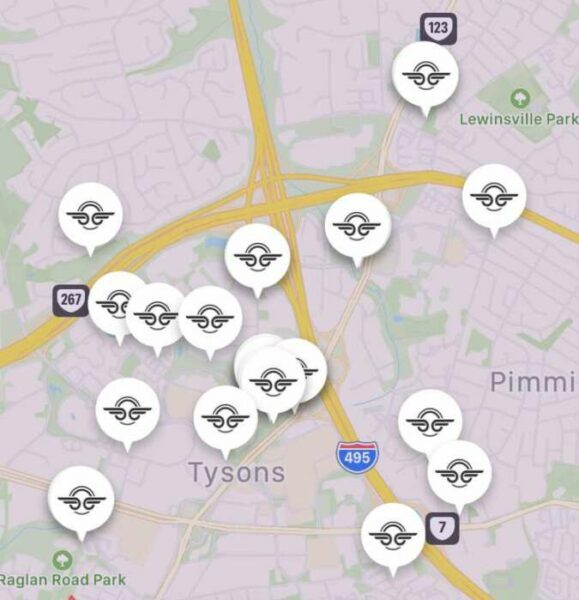
Now that e-scooters are here, how likely are you to use one? Are you excited to have this travel option, or do they seem like more of an obstacle than a convenience?
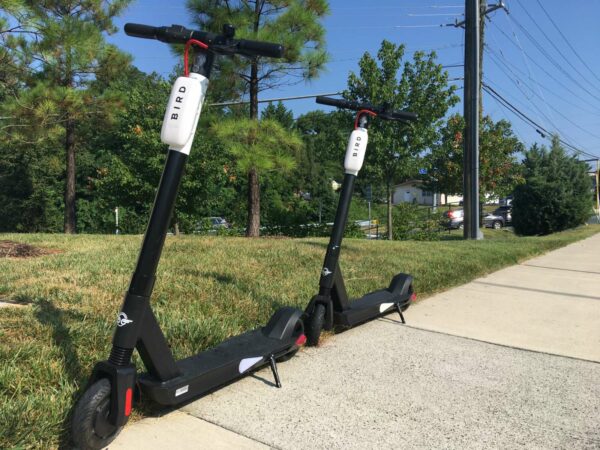
Hundreds of electric scooters have started popping up around Fairfax County after the county announced last week that it had approved two vendors for its shared mobility device program.
Bird and Superpedestrian’s LINK can each have up to 300 scooters in the county, but depending on usage, that number could go up to a combined 1,200 scooters for the two companies. The devices are available for rent, costing $1 to unlock with rates depending on ride time.
Bird has discounts for low-income and older residents as well as veterans and other users, and the company already listed the devices on its app, including six scooters in West Falls Church as of mid-morning Tuesday (July 27). Other clusters are farther south and southeast in the county.
Superpedestrian says it plans to make its scooters available this fall.
“Like bicycles, e-scooters can be used on a highway, sidewalk, shared-use path, roadway, or crosswalk,” the county said in a news release.
The county required companies to limit scooters’ maximum speeds to 10 miles per hour, and they can’t be used on sidewalks or crosswalks with signage banning shared mobility devices. The county said Tuesday such signage hasn’t been placed so far.
The county says users should leave scooters parked in areas that don’t impede normal car or foot traffic. People who violate the county’s rules can face a misdemeanor and fine up to $50 for the first offense and up to $500 for each subsequent offense.
“When riding an e-scooter, use the sidewalk when possible,” county transportation spokesperson Anna Nissinen said in a statement. “Remember, if you’re riding on the sidewalk, you are required to yield the right of way to pedestrians! If there is no sidewalk or other off-street path to use, you may ride a scooter on the road if the speed limit is 25 mph or less.”
She also noted that e-scooter users should stay as far to the right as practicable and use the bike lane if there is one.
The Board of Supervisors approved the devices in November 2019. They were allowed to start Jan. 1, 2020, but no companies applied for permits until the spring of 2021.
During the approval process, supervisors placed rules on operations as it noted concerns about scooters possibly being abandoned.
To help address issues, the board is requiring $5,000 bonds from companies operating in the county. The money can be used if county staff have to remove and dispose of abandoned scooters.
“If you notice an e-scooter parked in an inappropriate place or left on private property, you can contact the device operator listed on the e-scooter and the operator must remove it,” the county said, noting that people can email [email protected] to report any issues.
Near Arlington National Cemetery, pedestrians and cyclists can at times see rideshare scooters abandoned along trails, scattered horizontally on the grass.
Bird spokesperson Courtney Black said in a statement that the company looks to educate riders with proper scooter etiquette, reminding them to not leave scooters in the public right-of-way, ensuring that sidewalks, driveways, and fire hydrants are accessible.
The company also allows members to use its Community Mode feature to report issues, which can involve things such as damaged or poorly parked scooters. Bird reviews the reports and sends someone to respond.
When asked about the county’s concerns with abandoned scooters, Superpedestrian says it has worked with cities across the U.S. with similar requirements where it operates.
“We’re proud that we’ve never been asked to leave a city or stop operation,” spokesperson Jamie Perkins said in a statement.
To address potential issues, the company has an in-house fleet team of local workers to manage operations in a timely way, using technology to make sure scooters are parked according to requirements and re-parked when needed to ensure availability and prevent them from stacking up in one place.
Superpedestrian is assessing how many scooters it will place in the area, working with Fairfax County as it scales up operations.
“We prioritize our service to areas with critical connections to public transit, areas with parking congestion and business demand, and also serve underserved areas,” Perkins wrote.
Starting next year, motorized scooters will be able to go up to 8 miles per hour in the Maple Avenue and Nutley Street corridors.
The General Assembly passed legislation earlier this year allowing localities to regulate motorized scooters and skateboards before Jan. 1.
The Vienna Town Council approved last night (Monday) a one-year pilot program for shared mobility devices, which include motorized scooters, ahead of the end-of-year deadline.
The devices will be able to go up to 8 mph on the Nutley Street and Maple Avenue corridors and in areas adjacent t0 schools, parks and recreation centers. On side streets, the devices will be able to go up to 20 mph.
Town staff said that it is anticipated that people will use the devices on the sidewalks on Nutley and Maple and in the road on the side streets.
Each operator will be required to pay a $5,000 fee to the town and be capped at 150 vehicles per the mode of transportation — motorized scooters or bikes — for each company.
Currently, the town has not capped the number of companies.
Fairfax County plans to roll into the new year with regulations for motorized scooters.
The Fairfax County Board of Supervisors approved an ordinance for shared mobility devices on Tuesday (Nov. 19) after the General Assembly passed legislation earlier this year allowing localities to regulate scooters and motorized skateboards.
The county’s Department of Cable and Consumer Services will regulate the operators of the shared mobility devices. The operators will be required to submit permits and keep their fleets at certain sizes.
At first, operators can have fleets with up to 300 devices, with the possibility of going up to 600 devices if they can demonstrate the demand for the higher limit.
Dranesville District Supervisor John Foust said that he supports having operators start with a lower number of devices that can then be raised.
Starting Jan. 1, people riding scooters in Fairfax County won’t be able to go above 10 miles per hour.
During a public hearing on Tuesday before the board voted, two people testified in support of motorized scooters.
Ronit Dancis, speaking on behalf of the Tysons Partnership, told the board that motorized scooters can help solve the first-to-last mile commuter problem and
Dancis said that Tysons Partnership is worried that the absolute maximum of 600 scooters “will not be sufficient to meet Tysons’ needs” and that the 10 mph speed will be overly restrictive.
Dancis added that county staff said Fairfax County is working with the Washington Metropolitan Area Transit Authority to create scooter parking docks at the Metro stations.
Paymon Hadjiesmaeiloo, one of the co-owners of the Tysons Biergarten, told the board that motorized scooters are a cost-efficient transportation option for a rapidly growing part of the county. He added that increased mobility from scooters will benefit local retailers and businesses.
Braddock District Supervisor John Cook also summarized feedback from a constituent who said that — while useful devices — motorized scooters have become a nuisance from being abandoned around the Braddock District.
In addition to the shared mobility device regulations, Fairfax County plans to create a complaints process for improper use and abandonment of the devices, according to the county.
“Staff will coordinate [the] implementation of the complaint process with bordering jurisdictions and present a summary in the first year of SMDs in early 2021.”
The Falls Church City Council clashed over whether or not to allow motorized scooters on city sidewalks.
Councilmembers voted unanimously on Tuesday (Nov. 12) to continue working on the plan that would allow motorized scooter companies to take a test drive in Falls Church. But the vote was split 4-3 when it came to banning people from using such mobility devices on sidewalks, with the exception of Routes 29 and 7.
The safety of scooter riders and pedestrians was the top concern for city councilmembers as they discussed the implications of banning scooter riders on sidewalks.
Councilmember Phil Duncan, who voted in favor of banning scooters from sidewalks, said that cars should be mindful of scooters on the road and that riders should use bike lanes whenever possible.
Duncan noted a finding from the staff report, which claimed that scooter riders ranked sidewalks as their least favorite place to ride.
The city council decided to allow exceptions on Routes 29 and 7 based on safety findings from a staff report.
Councilmembers Letty Hardi, Ross Litkenhous and Marybeth Connelly voted against the ordinance to ban scooters on sidewalks.
“Preventing people from riding where they feel safe would just make this mode of transportation a non-starter. It would make this pilot pointless,” Hardi said.
Councilmember Connelly echoed Hardi’s concerns, but pushed for a compromise.
“We are assuming we are protecting the walkers on the sidewalks by saying ‘no scooters,’ but not protecting the scooter riders, who are also our neighbors, by saying they must ride always in the street,” she said.
Instead, she suggested adding another ordinance into the plan that would require scooter riders to give pedestrians the right of way on sidewalks. The city attorney present at the meeting noted that this was a viable idea but would require further discussion.
The city attorney suggested staff could work on a more efficient plan that would take her concerns into consideration.
“We have to have some assumption that the people in Falls Church who are using the scooters are not idiots,” Connelly said. “We have to rely on the judgment of the people using the scooters.”
The Falls Church City Council will review a second reading of the ordinance at their upcoming meeting on Dec. 9.
As the January deadline looms, the Falls Church City Council discussed proposals for e-scooters before state laws take effect and the city loses its chance to create regulations.
Concerns arose at both the Oct. 21 and Oct. 28 City Council meetings, including potential funding issues, underage use, parking and the upcoming pilot program. The pilot program would be limited to two scooter vendors, leaving companies to compete for a one-year trial period, Councilmember Ross Litkenhous said.
If implemented, the program would allow 14 scooters per 1,000 people into city limits. On average, the scooters would cost users $1 to unlock and a $0.25 per-minute fee, according to statistics gathered from Arlington and Alexandria.
On average 20% of e-scooter users ride them for social or entertainment purposes, while roughly 20% use them for shopping and errands. Another 20% use them to commute to the metro. Scooters could help to solve the first-to-last mile commuter problem, an expert brought in by the City Council and Councilmember Phil Duncan said.
There was some talk at the Oct. 21 meeting about using scooters to raise revenue for the city, by adding on taxes and unlocking fees. The city would charge each vendor an $8,000 permitting fee, regardless of fleet size, according to city documents. But no one seemed to have a concrete answer to the total profits.
“It would be interesting to see how much we can get out of it without impacting the demand,” Litkenhous said.
Councilmember Dave Snyder took another perspective, saying that it might cost the city more money. He said that police would be distracted by monitoring people, ensuring they are following laws and guidelines while riding the scooters.
Parking was yet another major focus of the conversations.
Several people suggested corrals, while others said that they encourage people to lean them against polls that are out of the way of pedestrians and cars. All of the councilmembers agreed that measures should be taken to ensure that they are not being left in the way of traffic or parked illegally in yards.
“Parking is going to be one of the major sources of complaints we will get, so we should prepare for that,” Councilmember Letty Hardi said.
Going forward, the Falls Church City Council will continue to discuss potential implementation plans before they make a final decision. At the next City Council meeting on Tuesday (Nov. 12), councilmembers are expected to discuss a first reading of the new ordinance regarding motorized scooters and shared mobility devices.
“I really think the success of this pilot is going to hinge on good communication,” Hardi said. “Lowering the bar to explain this won’t be perfect, [but] is important.”
This week, two public hearings in the Town of Vienna aim to get public input on a proposed motorized scooter program and extending the moratorium on new development applications for Maple Avenue.
The Transportation Safety Commission is set to unveil the proposed shared mobility devices pilot program and solicit feedback from the community on Tuesday (Oct. 29).
People can also email comments to [email protected].
Then on Wednesday, Oct. 30, the town’s Planning Commission will hold a public hearing on extending the suspension of the Maple Avenue Commercial (MAC) zone.
The proposal would extend the moratorium to June 30.
The Vienna Town Council first put the moratorium in place last September to allow the town staff time to redesign the town’s guidelines.
Both public hearings are set to start at 8 p.m. at Town Hall (127 S. Center Street).
Plans to regulate motorized scooters are zooming ahead in Fairfax County ahead of the end of the year deadline for creating regulations.
Staff from the Fairfax County Department of Transportation (FCDOT) and the Department of Cable and Consumer Services presented the proposed ordinance during the Transportation Committee on Tuesday (Oct. 29).
The county has until Jan. 1, 2020 to implement regulations on motorized scooters, skateboards and bicycles. After that date, the scooter companies can zoom around however they please.
Scooters are an increasingly popular alternative transportation option and are already in use in the county. (The City of Falls Church and the Town of Vienna are also in the process of creating their own pilot programs.)
The proposed ordinance would create a new chapter in the code that would exclude Capital Bikeshare. The ordinance would allow for an initial fleet size of 300 shared mobility devices — and up to a maximum of 600 after the company’s meet certain requirements, according to the presentation.
Scooters would be allowed on highways and sidewalks — unless signs say otherwise, according to the presentation.
Rebecca Makely, from the Department of Cable and Consumer Services, said that county staff knocked down the proposed speed limit from 15 to 10 miles per hour.
“We do believe that this is a conservative approach,” Makely said, adding that the county is considering pedestrian safety along with the proposal.
Dranesville District Supervisor John Foust, who has expressed concern about a 15 mph speed limit, said that Tysons Partnership wants to see higher speed limits and larger numbers of vehicles allowed.
Next Tuesday (Oct. 29), the Board of Supervisors is set to vote on whether or not to authorize a public hearing about the proposal on Nov. 19.
The Vienna Town Council is looking to implement a pilot program for dockless scooters and bicycles as a deadline nears for scooter regulation.
Legislation passed during the General Assembly session in January allows localities to regulate scooters and motorized skateboards, however, the localities have until Jan. 1, 2020 to take action to implement any regulations. After that date, the scooter companies can zoom around as they see fit.
Scooters, an increasingly popular alternative transportation option, are already around the area. Fairfax County and the City of Falls Church are also currently drafting up their own pilot programs for scooters.
At a work session last Monday (Sept. 9), the Vienna Town Council raised safety concerns while discussing a proposed pilot program by Public Works staff.
Councilmember Steve Potter said that he is worried that scooters going at 20 miles per hour could end up hurting pedestrians and urged the council to consider the fiscal impacts of the program, like impounding costs, late filing fees and recovery costs.
“I think we should have a schedule for public input surveys and public education efforts,” Potter said, adding that he wants representatives from the police department to also be involved in the decision making. “This is no small thing.”
Mayor Laurie DiRocco asked the Town Attorney to find out if the council can mandate helmet wearing for dockless scooter and bicycle riders.
Currently, the town is considering implementing a one-year-long pilot program instead of an ordinance before the January deadline. According to town documents, the program is based off the programs by Fairfax, Alexandria, Falls Church and Arlington County.
The proposed program would cap the maximum number of devices to 250 per company, allowing the company to increase the number up to 25 more e-scooters or e-bikes with “if they demonstrate at least three trips per device per day in the previous month.”
Each company would have to pay a one-time permit fee of $5,000 and a right-of-way use fee of $0.05 per trip.
While town staff suggested negotiating with Kimley-Horn, a consulting firm that focuses on transportation, planning and engineering, Councilmember Doug Noble balked at the idea of working with the firm because of its ties to private consulting. “They are not the only show in town,” Noble said.
Noble also urged the Town Council to look into investigations of scooters’ battery fires and inadvertent sudden stops.
Councilmember Pasha Majdi suggested that the Town Council implement “an extremely limited pilot program as a placeholder until a multi-modal plan with Kimely-Horn is created.”
Majdi adamantly said that he does not want to see motorized scooters on sidewalks — a sentiment he said scooter companies like Lyme and Bird share.
Getting data on how often the scooters go from Vienna to Tysons could give the Town Council insight into scooter demand in the area, Councilmember Nisha Patel said.
“I believe that will tell us a lot about how often these scooters will be used,” Patel said. “We are so close to Tysons and Tysons is the next major city in the area.”
In addition to the data, Patel said that parking hubs for scooters could help cut down on littered scooters around town. “It’s like dispositing your shopping cart in those metal racks,” Patel said.
Councilmember Howard Springsteen suggested forwarding the proposal to the Transportation Safety Commission — an idea that was supported by several councilmembers and the mayor.
The proposed pilot program is set to go before the Town Council on Dec. 9.
“We should get this done,” Springsteen said. “The clock is ticking.”


